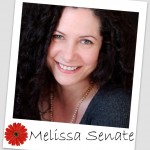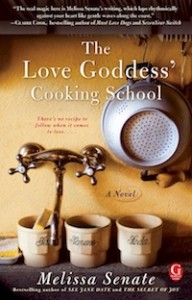 ~ Interview by Melina Kantor
~ Interview by Melina Kantor
What a thrill to have the fabulous Melissa Senate, author of 10 novels (including See Jane Date) and former editor for Harlequin, visiting the blog today!
Welcome Melissa!
You spent ten years as an editor for Harlequin. What inspired you to make the transition from editor to author?
Back in the year 2000, when I wrote my debut novel, See Jane Date, there was suddenly a huge, glittering market (chick lit) for the book I had in me, the book I’d always wanted to write. Back then, I wasn’t sure if I COULD write an entire novel. I’d been an editor for so long and was in awe of authors and the creativity, determination and discipline it takes to write a novel. But with the market wide open for chick lit and my story bursting to come out of me, I sat down and wrote it. I’m so glad I believed in myself to try–so much of writing and publishing is about believing in yourself. Trusting yourself. And gluing your tush in the chair.
How does your editing background influence your writing process?
Oh how I wish it didn’t influence my process! I can’t write a first draft and then go back in and revise. I have to write a first, second and third draft of every page before I go on the next page. I edit and polish as I go, which I’ve been trying to shake for years, but it’s my process, darn it. I’d like to be able to just let myself go, write that “shitty first draft” that the great Anne Lamott talks about in Bird by Bird (a great book on the craft of writing) and then rewrite/revise once I have the whole thing down. But I have to edit as I go.
What was it like to have your debut novel, See Jane Date, turned into a TV movie? How much input did you have? Were you happy with the casting? (Antonio Sabato Jr. was in it, so we’re thinking. . . yes?)
I still can’t believe it even happened! I had zero input, but I love how the movie came out–the screenwriter really captured the spirit of the book. I loved the casting! And yes, Antonio Sabato Jr. was the heartthrob on my college walls in all his Calvin Klein underwear model glory (remember that poster?). The TV movie will be on April 10th on the Lifetime channel if anyone wants to catch it–it’s really cute!
Two of your books are for teens. What are the differences between writing for adults and writing for a younger audience?
One difference is how AMAZINGLY HARD writing for teens is! Or for me, anyway. To write authentically in the voice of a teenager, to realistically capture what it feels like to be a teen, is no easy feat. I thought that writing for the YA market would be as simple as doing what I always do, just setting the book in high school. I was wrong. Everything is different. Tone, voice, structure, feel, language. YA and adult are two very different worlds! I love writing both YA fiction and adult fiction and do hope to dream up another teen novel.
 More Magazine called your latest book The Love Goddess “one of 17 food-themed books to eat up!” What inspired you to write about cooking?
More Magazine called your latest book The Love Goddess “one of 17 food-themed books to eat up!” What inspired you to write about cooking?
My son (who was then nearing his 6th birthday) and I were cooking together one morning, and he was beating eggs in a bowl (or trying to, anyway), and he suddenly stopped and put his little hands in prayer formation and said into the bowl: “Please let Mommy say yes to getting me a rat, mouse, rabbit or hamster for my birthday.” He repeated that, and continued beating the eggs. The idea of wishing into food, into that wish being a final ingredient, blossomed into a novel!
What role do you feel social networking should play in the life of a writer?
I love social networking. I’ve always been somewhat introverted and a bit of a loner (a lot of writers probably are), and the solitary work of an author suits that. But with the click of keys, you can be part of this wonderful, huge community of authors, book bloggers, publishers, agents, booksellers–a world connected to the passion we all share: love of books. Facebook and Twitter are incredibly great resources, tools for promotion, social interaction–and more.
Do you consider your books “chick lit?” Why or why not?
You know, there are so many definitions of “chick lit.” See Jane Date was classic chick lit. The Love Goddess’ Cooking School might be considered more a hybrid between chick lit and women’s fiction, but only because chick lit has been defined so narrowly, whereas women’s fiction seems a new (not really new) label to describe novels aimed at women and that have a bigger focus, a bigger story to tell, perhaps. Everyone says Jennifer Weiner is chick lit, but her latest novels all have big focuses and explore so many facets of life, in fact, her very first book ran very deep. So who the heck knows what these labels truly mean? I always liked the term chick lit and I love chick lit books, but I don’t like how narrowly the books are viewed. Books that explore issues near and dear to women will always be front and center in bookstores (and e-readers).
Thanks so much for inviting me to the blog, today! I love hearing from readers and writers, so feel free to contact me at melissa @ melissasenate. com, friend me on Facebook:https://www.facebook.com/MelissaSenate and follow me on Twitter: http://twitter.com/MelissaSenate. For more info about me and my books, you can check out my website at http://www.melissasenate.com
Thank you, Melissa! 🙂
Melissa Senate is the author of 10 novels, including her latest The Love Goddess’ Cooking School, which Publishers Weekly says reinvents comfort food. A former editor at Harlequin Books and Alloy Entertainment in New York City, Melissa now lives on the coast of Maine where she writes and freelances as a copywriter and editor.

